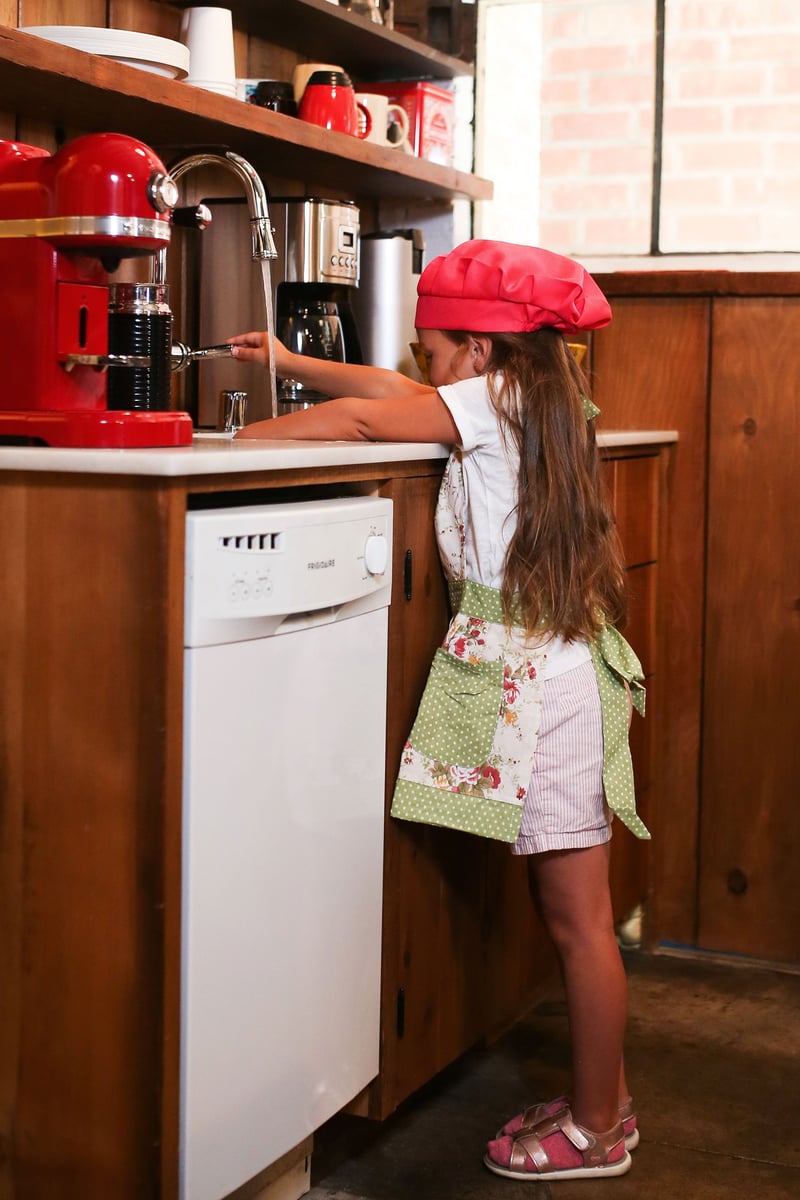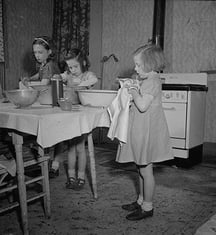
I recently read Enid Blyton's 'Magic Faraway Tree' series with my sons and they were astonished. Not so much by the exciting adventures of Silky, Moon Face et al but more by the volume and complexity of chores the young protagonists were expected to do. Barely school-age children were chopping wood, preparing meals, darning socks and cleaning houses.
"Were little kids actually allowed to do that in those days?" asked my eldest. He did not see these chores as a burden but marvelled at the amount of responsibility the children in the stories were given by their mother.
We no longer allow our kids the freedom to skip off into the woods unaccompanied, as Blyton's 1940s characters did. We shield them from dangerous and onerous household tasks (I certainly have no plans to allow my six-year-old to chop wood or stoke fires any time soon). But are we demanding too little of our children around the house? Should we be giving them greater responsibility?
Until the late 1970s, even young children were expected to contribute much more to family life than they do now. They were allocated tasks such as car cleaning, meal planning, repairs and maintenance, ironing, looking after sick or younger family members, shopping, dish washing, lighting fires and decorating.


Nowadays technology has removed the need for many of these chores and, as children under 12 are not legally allowed to walk any distance without adult supervision, we cannot send them off to run errands or shop for the family. We make space and time for children to focus on their homework, interests and friendships. We shelter them from the daily drudgery of cleaning, laundry and meal prep. The household chores we assign to our youngsters are often token or cursory - feeding pets, clearing the table, packing school bags - and don't give them any real sense that they are benefiting the family as a whole. We bribe and reward our children with treats and incentives for completing tasks that should be second nature to them.
Not only do we risk raising a generation of privileged, sensitive 'snowflakes', unable to fend for themselves; we diminish our kids' sense of worth and self-esteem, giving them the message that they are 'not up to the job'.
Is it time to ask more of our kids?
Why we should ramp up the chores:
- It equips kids with a greater range of life skills and abilities.
- Mastering and completing difficult tasks gives children more confidence and autonomy.
- It teaches fairness and team work.
- It makes children feel valued and important as they contribute to the family.
- It frees parents up to spend more quality time with their children.
- It makes children more responsible for their actions (they clean up their own mess and deal with the consequences of their mistakes).
- It teaches kids empathy and nurtures a desire to contribute to others' well-being.
What kind of jobs can I expect my children to do?
This will depend on age, stature and manual dexterity but all of the examples below could be expected of primary school age children, if not younger. I have indicated lower-age limits in parentheses.
- Clean up own spills and mess (from preschool. I know a mum who successfully potty trained her toddler by making him clean up his own 'accidents'. I wouldn't go that far, but teaching a preschooler how to use a damp cloth to clean up a spilled drink is perfectly acceptable)
- Clean up other people’s mess (as young as possible - get children into the habit of looking out for others, jumping up to help if someone drops or spills something)
- Clean bathrooms - yes, even toilets (primary age)
- Sort, fold and put away laundry (primary - younger children can sort and match socks and put things in drawers)
- Put groceries away after a shop - no more excuses for ‘I can’t find the tomato sauce’! (primary)
- Cook a family meal once a week (from age 10. Start with pancakes or pasta with bottled sauce. Younger children can take responsibility for preparing a salad or simple desserts.)
- Prepare and pack own lunch box (upper primary)
- Sew on buttons and sew up hems (upper primary)
- Weed/water garden (from preschool)
- Empty (and clean) bins (as soon as tall/strong enough)
- Hang out washing (ditto)
- Clean windows (upper primary)
- Vacuum and clean car interior (primary)
- Vacuum/mop floors (requires some upper body strength but easily achievable from the age of seven)
- Spring cleaning - clean out cupboards/pantry/fridge/freezer etc (primary)
- Whole family chores, eg a garage clear out (any age - get everyone involved and working as a team)
Some tips:
Chores should be regular and mandatory - draw up a roster if necessary.
Children should do chores that contribute to the whole family, not just chores that benefit themselves.
Tasks should be completed and not abandoned if they go wrong or are deemed too 'boring'.
Don't make jobs gender-specific. Boys and girls should be expected to do the same chores (eg empty bins, sew on buttons).
Involve children in planning tasks and family decisions - shopping lists, 'to do' lists, decorating projects etc.
Avoid using bribes and rewards as incentives .. but do praise for good work and great attitude.
Ensure your kids have the tools they need and a suitable environment to complete their chores, eg step to elevate them to reach kitchen sink, cupboards at height accessible for putting things away, tap for garden hose not too stiff to turn.
Include some whole family tasks where you can all work together - eg gardening, spring-cleaning.
Be prepared to go backwards before you go forwards
It will take time and repetition to teach your children to do household tasks. They will get it wrong, make a mess and cause you more work in the beginning. You will have to supervise while they learn to use sharp knives, hot stoves, lawn mowers and other potentially dangerous tools. Persevere. Be encouraging. The effort you put into this now is an investment in your own future as well as your child's; think of the time you will save once you can comfortably delegate some of your existing chores. Not to mention the pasta with bottled sauce you could be enjoying tonight!!
What chores do you expect your kids to do? Tell us in your comments below.










